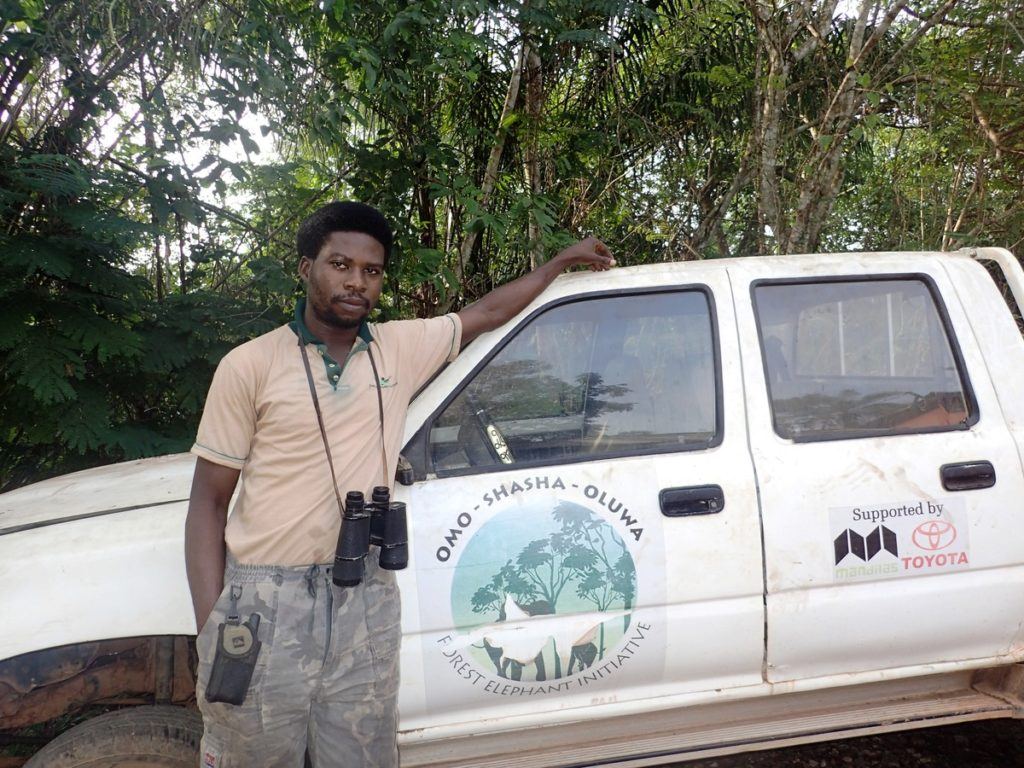The lush, lowland rainforest of Cross River National Park’s (CRNP) Oban Division, in Nigeria, thrums with a multitude of sounds—the songs of birds, the rush of water from a nearby stream, and in the distance, the trumpeting of forest elephants. Conservationist and 2019 WCN Scholarship recipient Peter Abanyam leads a group of park rangers through the dense foliage. He is training them to use the CyberTracker and Spatial Monitoring and Reporting Tool (SMART)—a software that runs on mobile devices—to monitor wildlife and human activities and measure anti-poaching patrol effectiveness.
Crossing a stream, they hear quiet rumbling in a leafy grove and soon discover a family of Cross River gorillas resting. Dazzling butterflies soar overhead, radiant against the deep green of the closed-canopy rainforest. But what stops Peter in his tracks is the sight of a large, burgundy-hued monkey making its way through the trees, a Preuss’s red colobus. Critically endangered and on the verge of extinction in Nigeria, a Preuss’s red colobus is seldom seen in this part of the forest. Peter himself has only sighted this primate species a handful of times; in 2014, he was part of a team of conservationists who rediscovered its presence in the park while conducting a wildlife survey of the park.
Known only to exist in western Cameroon (Korup National Park and the Ebo Forest Reserve) and southeast Nigeria (Oban Division of Cross River National Park), the Preuss’s red colobus population is plummeting due to deforestation and targeted, commercialized bushmeat hunting. A lack of public awareness adds to their plight. “Their sluggish nature makes it easy for hunters to kill them,” Peter said. “Their population has witnessed a rapid decline in the last two decades, this is why I have chosen to save them. What is most urgent to me now and the next few years is to educate local communities and encourage them to get involved in conservation, and to promote local engagement geared towards protecting red colobus in the area.”
As a child living at the edge of Boshi forest extension of Cross River National Park in Nigeria, Peter loved and cared for wildlife and nature; he grew up on stories of his grandfather’s—a former hunter—many encounters with primates and other wild animals. His grandfather eventually decided to give up hunting, a decision that significantly influenced Peter’s passion for saving wild animals. “I often feel it is a way of paying back for what he took from the wild in his many years of hunting,” he said.
Peter earned a degree in Environmental Protection and Resource Management, then joined WCS Nigeria in 2011. He introduced the first SMART project in the Oban Division of CRNP, leading to the arrest of over 82 poachers, and seizure of 7,834 wire snares, and 5,653 expended cartridges.
As Peter completes his Master’s degree in Conservation Leadership at the University of Cambridge, his focus is on incorporating SMART into the Greater Gola Landscape Strategy in Sierra Leone. He looks forward to applying his knowledge and skills back home in Nigeria, engaging local residents in community-based conservation initiatives; implementing alternative livelihood initiatives like snail farming, beekeeping, and improved cocoa farming to improve socio-economic lives of local communities; and protecting wildlife, including Cross River gorillas, Nigeria-Cameroon chimpanzees, and Cross River elephants, especially focusing on critically endangered slender-snouted crocodiles, and, of course, the Preuss’ red colobus.


